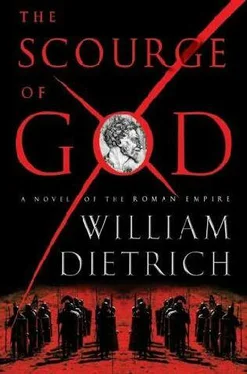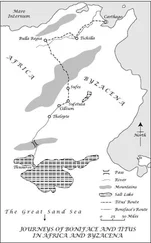William Dietrich - The Scourge of God
Здесь есть возможность читать онлайн «William Dietrich - The Scourge of God» весь текст электронной книги совершенно бесплатно (целиком полную версию без сокращений). В некоторых случаях можно слушать аудио, скачать через торрент в формате fb2 и присутствует краткое содержание. Жанр: Фэнтези, на английском языке. Описание произведения, (предисловие) а так же отзывы посетителей доступны на портале библиотеки ЛибКат.
- Название:The Scourge of God
- Автор:
- Жанр:
- Год:неизвестен
- ISBN:нет данных
- Рейтинг книги:5 / 5. Голосов: 1
-
Избранное:Добавить в избранное
- Отзывы:
-
Ваша оценка:
- 100
- 1
- 2
- 3
- 4
- 5
The Scourge of God: краткое содержание, описание и аннотация
Предлагаем к чтению аннотацию, описание, краткое содержание или предисловие (зависит от того, что написал сам автор книги «The Scourge of God»). Если вы не нашли необходимую информацию о книге — напишите в комментариях, мы постараемся отыскать её.
The Scourge of God — читать онлайн бесплатно полную книгу (весь текст) целиком
Ниже представлен текст книги, разбитый по страницам. Система сохранения места последней прочитанной страницы, позволяет с удобством читать онлайн бесплатно книгу «The Scourge of God», без необходимости каждый раз заново искать на чём Вы остановились. Поставьте закладку, и сможете в любой момент перейти на страницу, на которой закончили чтение.
Интервал:
Закладка:
The signal fires were lit and the horns sounded from ridge crests to the deepest valleys. All Aquitania was stirring, from the shores of the great western ocean to the peaks of the central massif. The king was calling the Visigoths to war! The arrows fletched in the long dark days of winter were bundled and strapped, the long swords of the Germans were rasped on oiled stones, and the stout lances with their leaf-shaped tips of silver were carried forth. Great shields were shouldered, armor strapped, and helmets polished. Anxious boys were chosen for the campaign, while, groaning disappointment, their younger brothers were ordered to care for home at least one more season. Somber wives packed satchels of dried meat and grain while daughters stitched campaign clothing and wept at what might come. The Visigoths were going to war! Saddles were oiled, boots soled with new leather, belts cinched, and travel cloaks tied. The gathering men could be seen coming down from a dozen hills into every village and from a dozen villages into every town, rivulets becoming streams and streams becoming rivers.
The word had gone out. At long last, Berta would begin to be avenged.
In Tolosa, a thousand knights were waiting on horseback for their king. Their horses were huge, the hooves heavy, the tails tied with ribbons and the manes decked with coins. The Visigothic helmets were high peaked and plumed, their horse shields oval, and their spears were as high as a roof. It thrilled me to wait with them.
Finally stepping out onto the old Roman portico was Theodoric himself, tall and resplendent in gilded mail and a shield embossed with bright bronze. His sons Thorismund and Theodoric the Younger came with him, just as proudly armored and armed; and at the sight of them the assembled warriors roared greeting with a cry that made me shiver.
Their king spoke deeply but quietly, his words repeated like a ripple through the crowd. “Our fathers wrested this rich land. Now, it is our turn to defend it. Hun and Vandal have joined in league, and if either wins then our world is lost. My daughter asks vengeance. So hear me, my warlords! We ride to seek it!”
A thousand spear shafts banged against a thousand shields in acclamation. Then Theodoric mounted, raised his arm, and they were off. A thick, muscled parade flowed down the streets of Tolosa for its great Roman gates, thundering out to meet the far greater hordes of fellow tribesmen waiting in the fields and woodlots beyond. Thousands would become tens of thousands, and tens of thousands an army.
The host of the Visigoths would ride to join Aetius, and the West would rally behind them.
Would it be enough to stop Attila?
I galloped ahead to bring my general this glad news, looking back at the tower that Berta watched from. Now she would have her revenge.
PART THREE
THE BATTLE OF NATIONS
XXIII
Aurelia was a walled Roman city that stood in the path of any armies marching through the lowlands of Gaul. Situated on the Loire River, it was the heart of Rome’s most fertile province. If the Huns could occupy it, they would have a strategic capital from which to dominate western Europe. If the Romans could hold it, their defense would be simplified.
Attila hoped that treachery would deliver the city. Sieges were costly; betrayal cheap.
It was one of the ironies of history that the Alan tribe that had come to control Aurelia, and the Loire, were distant cousins of the Hun. They now were part of that patchwork confederacy of Roman, German, and Celtic peoples that made up the Western Empire. The tribal migrations that had upended the region two generations before had settled into an uneasy coalition of chieftains, generals, and opportunists who had carved out spheres of influence. Each tribe owed nominal allegiance to the Empire, and yet each enjoyed a measure of independence, because that empire was weak.
Each tribe had been placed by the emperor to check its neighbor. The barbarians depended on Rome, envied Rome, disdained Rome, feared Rome, and yet thought of themselves as newly Roman.
If the Visigoths were the most powerful tribe, the Bagaudae, Franks, Saxons, Armoricans, Liticians, Burgundians, Belgicans, and Alans each had territories and armies of their own. Two months before the Hun armies marched, emissaries had come to Aurelia to sound out the king of the Alans, the wily Sangibanus. Attila was coming with the greatest army the West had ever seen, the king was warned.
Sangibanus could fight for the Romans and be destroyed, or join the Huns and remain a king, albeit a vassal.
It was a grim choice, made worse by the fact that Sangibanus’s own belligerent warriors had no intention of submitting to anyone. Worse, if the king’s treachery was discovered before the Huns arrived, Aetius might make an example of him. Yet to fight Attila was to risk annihilation.
“You cannot sit out this war-you must choose,” insisted the young and rising Hun sent to persuade Sangibanus. “You can rule under Attila, or you can die under the Romans.”
“My people won’t follow me to the Huns. They already flatter themselves that they’re Romans and Christians. No one wants to go back to the ways of our grandfathers.”
“ They need not make the choice. You must, for their safety. Listen, I have a plan so that even the gate guards need not choose. Here is all you have to do . . .” The Hun’s name was Skilla.
“A child to see you, bishop.”
“A child?”
“He doesn’t have the manners of one. Or any manners at all, as far as I can see. He says it’s about the safety of the church. It’s really quite peculiar.”
“This is a bold child.” Bishop Anianus looked thoughtful.
“He insists on keeping his head covered. Were he an assassin-”
“Bertrand, I am the easiest of all men to kill. No one need send a child to do it, in a cape. They could assault me in the street, stampede a wood cart across me, drop a brick from a parapet, or poison the daily sacrament.”
“Bishop!” But of course this was true. If this visitor was strange, their own bishop was stranger. He had the habit of disappearing for weeks at a time as hermit and pilgrim, talking in his own way to God. Then he would suddenly reap-pear as if never absent. He visited the sick and lame without fear of contagion, gave penance to murderers and thieves, and conferred with the powerful. In an increasingly lawless world, he represented divine law. His piety and good works had made him not only popular but also a leader.
“But they don’t harm me because it is God’s will,” Anianus went on. “And it is His will, I think, that I see this mysterious visitor. These are strange times, and strange people are afoot.
Demons, perhaps. And angels! Let’s see which he is.” Their visitor had overheard. “Too ugly to be an angel and too charming to be a demon,” he proclaimed, pushing back his hood. “Of strangeness, I will confess to.” Bertrand blinked. “Not a child but a dwarf.”
“An emissary from Aetius, bishop. My name is Zerco.” The bishop’s face admitted surprise. “Not the usual representative.”
“When I’m not representing my master I amuse him.” Zerco bowed. “I admit to being unusual but not useless. Not only am I a fool by profession, but I came through the gates with Burgundian refugees. No one notices a halfling if there are children all around.”
“I thought it was the business of a fool to be noticed.”
“In less perilous times. But there are agents of Attila in Gaul as well as agents of Aetius, and I’d prefer not to meet them. I bring you greetings from the general and a warning that Aurelia is in the path of the Hun. Aetius wants to know if the city will hold.”
Читать дальшеИнтервал:
Закладка:
Похожие книги на «The Scourge of God»
Представляем Вашему вниманию похожие книги на «The Scourge of God» списком для выбора. Мы отобрали схожую по названию и смыслу литературу в надежде предоставить читателям больше вариантов отыскать новые, интересные, ещё непрочитанные произведения.
Обсуждение, отзывы о книге «The Scourge of God» и просто собственные мнения читателей. Оставьте ваши комментарии, напишите, что Вы думаете о произведении, его смысле или главных героях. Укажите что конкретно понравилось, а что нет, и почему Вы так считаете.












